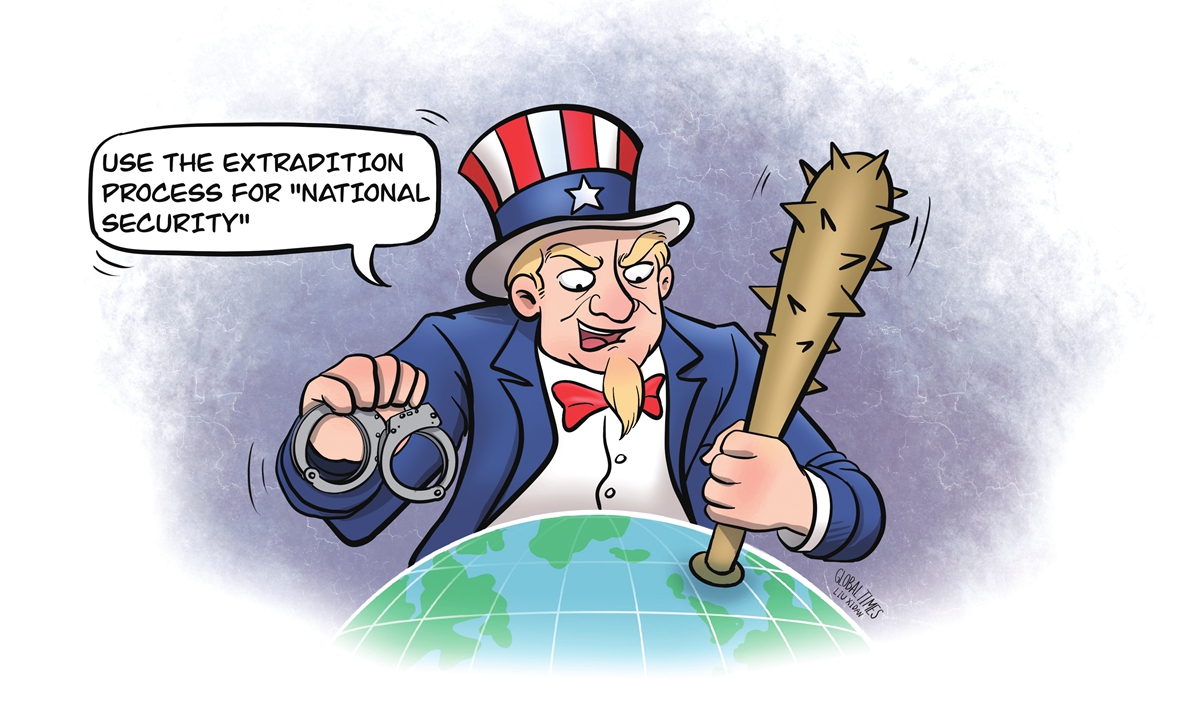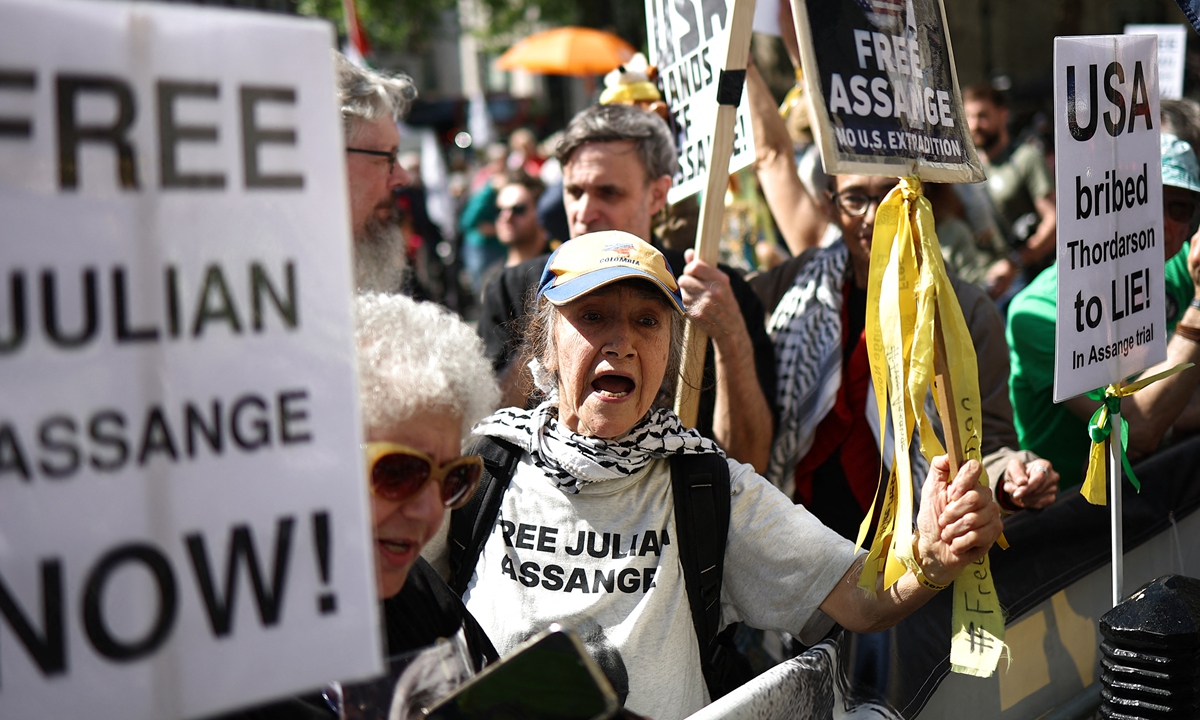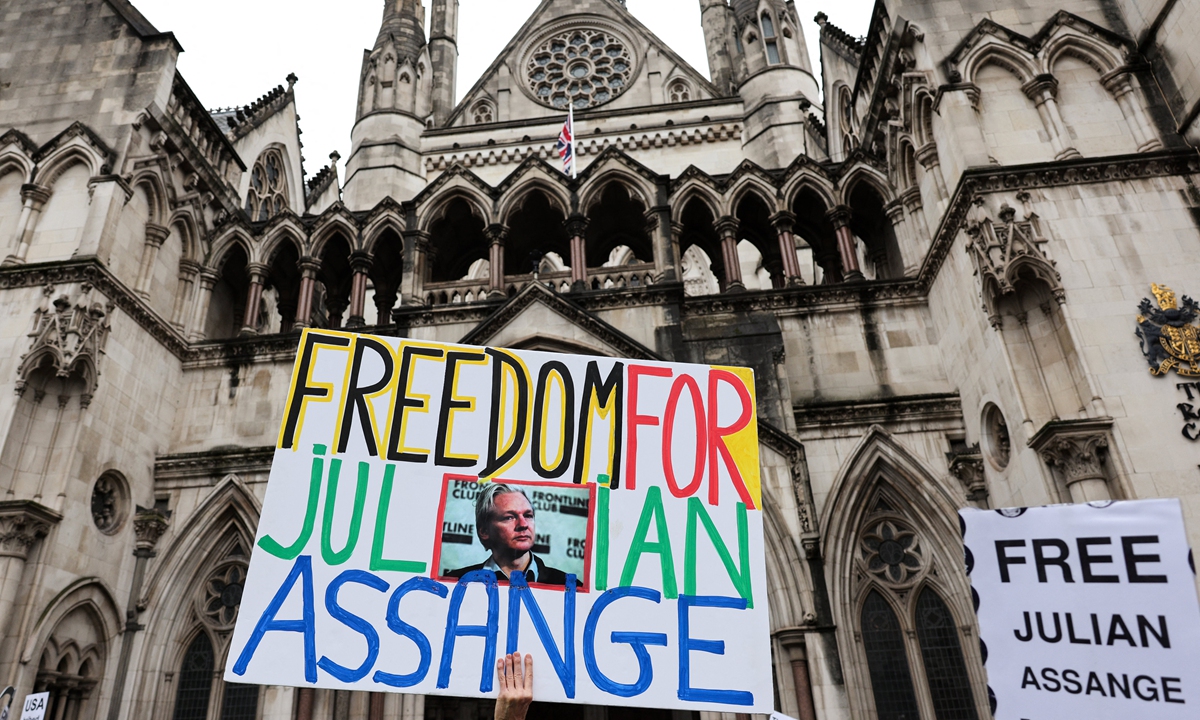
Illustration: Liu Xidan/GT
After enduring more than a decade of criminal detention, Julian Assange, the founder of WikiLeaks, finally reached an agreement with the US Justice Department, "acknowledging" his involvement in the crime of espionage but at the same time regaining his freedom. Many may recall that Assange, through WikiLeaks, repeatedly exposed classified US intelligence, bringing international attention to many unlawful acts committed by the US that violated human rights and our common sense of justice. As a result, he was forced to evade US custody by constantly seeking refuge across the globe. In December 2010, Assange eventually surrendered to the London Metropolitan Police. Soon after, he sought political asylum in the Ecuadorian embassy in London, where he remained for a total of seven years before he was arrested again by the London police and faced the prospect of being extradited to the US to stand trial.
To the average person, this lamentable story vividly demonstrates the fact that offending the US can leave one with no safe haven in the world. However, to lawyers who care about human rights and justice, it serves as a rather frustrating case study. It is important to remember that the process of extradition is designed solely to combat transnational criminal activities, ensuring individuals who have committed serious crimes cannot escape justice simply by fleeing to another country. This system is intended to target serious criminals, not political defendants. Unfortunately, the US has repeatedly exploited this process, using national security as a pretext for pursuing political dissidents.
In 2004, the United Nations formulated a Model Law on Extradition for the extradition of suspects. Section 4 (1) of the Model Law states that the process of extradition does not apply to individuals accused of committing political offenses. Article 3 of The United Nations Model Treaty on Extradition also clearly provided extradition shall be refused if the offence involved is of a political nature or the request is on account of the suspect's political opinion. These models demonstrate convincingly that there has long been an international consensus on the fundamental distinction between criminal and political offenses in relation to the process of extradition.
Prior to the handover in 1997, Hong Kong enacted the Fugitive Offenders Ordinance, which clearly stated that the ordinance does not apply to "an offence of a political character" or to suspects who are being prosecuted on account of an individual's political opinion. Under this Ordinance, the court and the Chief Executive serve as separate gatekeepers, ensuring that suspects cannot be extradited to another jurisdiction for trial based on their political background or beliefs, whether through judicial or administrative means.
Legally, the stringent requirements for political safeguards in the Hong Kong Ordinance highlight the false nature of the rhetoric surrounding the 2019 Extradition Bill's alleged intent to "send individuals to China." Unfortunately, some individuals in Hong Kong were easily deceived, causing significant social unrest. The central government had to intervene and enact the National Security Law to uphold the principle of "One Country, Two Systems" in Hong Kong.
Cases such as Assange and Meng Wanzhou suggest that the US looks at the process of extradition rather differently, using it as a powerful political tool. However, this does not mean that other countries or jurisdictions will blatantly disregard the protection of basic human rights as the US does. On the contrary, the vast majority of countries and jurisdictions adhere to the international consensus on the extradition of suspects as outlined by the United Nations.
Be that as it may, the influence of the US and its Western allies cannot be ignored. As of today, while China has signed extradition treaties with nearly 50 countries in the world, including several European nations such as Spain, France and Italy, Western countries like the US and the UK continue to refuse to establish extradition arrangements with China. Moreover, 10 major Western countries, including the US, the UK and Australia, claim to have "suspended" previously effective extradition treaties with Hong Kong due to the 2019 riots.
This is as baseless as it is absurd. Countries that constantly abuse universal extradition principles are now accusing the Hong Kong government of "potential" abuse and suspending hitherto effective extradition arrangements. Such accusations and reactions simply make no sense. This is because under the current extradition regime, the courts of these countries have complete discretion to refuse to extradite criminals back to Hong Kong. However, if Hong Kong were to extradite criminals back to their countries for trial, it could hardly be said it would cause any human rights concerns. Put simply, this glaring contradiction serves as a compelling testament to the prioritization of politics over the principles of justice and the rule of law by the US and its Western allies. This is a dangerous trend threatening not only any effective legal measures to limit cross jurisdiction crimes but also basic human rights. One can only hope that US and its Western allies would, in time, respect universal standards on extradition and follow the directives of the United Nations.
The author is a member of the Executive Council and convenor of the Path of Democracy think tank. opinion@globaltimes.com.cn


